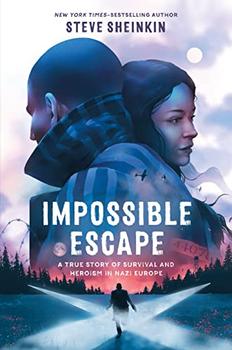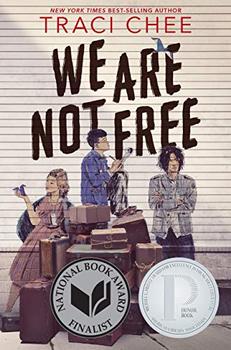Summary | Excerpt | Reviews | Beyond the book | Read-Alikes | Genres & Themes | Author Bio

A True Story of Survival and Heroism in Nazi Europe
by Steve SheinkinSteve Sheinkin's work of narrative nonfiction for young adults Impossible Escape explores themes of Jewish history and wartime tragedy, telling the story of a real-life young hero. Rudi Vrba is a rebellious teenager living through the horrors of World War II. Frustrated by a sense of helplessness, he sets out on a journey that takes him across countries, until he finally lands in the infamous Auschwitz concentration camp. As he gradually comes to understand what is going on there, he becomes determined to survive and escape the camp — to inform the world of the cruelty being imposed on the Jewish population by the Nazis.
Impossible Escape is both informative and suspenseful. It is packed with details about the war and Nazi Germany, providing vital context for the reader. As the war stretches on and Germany rapidly advances, Rudi resolves to escape and save as many people as possible. He makes it through and out of Auschwitz, becoming the first Jewish prisoner to accomplish this, through a mixture of luck, courage, planning, and support. Despite a friend's warning to trust no one, Rudi's journey is only successful because many strangers, Jewish and non-Jewish, sympathize with him. Strangers risk their lives letting Rudi stay in their houses; fellow prisoners and friends save him from many near-death situations and assist him in his getaway.
Although he escapes with his friend Fred Wetzler, the book's focus remains on Rudi, with occasional detours into the lives of other friends — Filip Müller, a fellow prisoner who works in the gas chambers, and Gerta Sidonová, Rudi's friend from back home who goes into hiding to escape the camps and later joins the Jewish underground resistance. This allows the reader to see Rudi's remarkable development across the book. In just two years, he is transformed from a rebellious and angsty teenager who leaves home in a rush of adrenaline with no real plan to a prison-hardened young man who has to calculate his every move to ensure he is not killed. Rudi realizes the importance of remembering the details of the Auschwitz camp so he can inform others once he gets out. He makes mental notes about how many people are being brought, how the gas chambers work, the different sections of the camp, and so on. After his escape, this information sounds one of the first alarms about the Nazis' atrocities and ultimately saves thousands of lives.
Sheinkin's writing, while exhilarating, is also very chilling as he describes the Nazis' final solution in depth. Rudi realizes that people being taken to the camps have no inkling of what is in store for them. They imagine resettlement — where they would do manual labor but could stay with their families and would be allowed food, medical care, and so on. The Nazis send fake letters from people who died at the camps, claiming that life there was not so bad. However, once people climb onto the trains, reality sets in. Families are separated, people die of starvation and disease, or are killed in gas chambers before they even make it to the camp. The relatively healthier prisoners, such as Rudi and Filip, are forced to do manual labor for hours at a stretch, are barely fed, monitored every second of the day, and killed for the slightest blunders. Survival and escape both seem next to impossible.
After two years of observation and planning, Rudi and Fred accomplish their daring escape. They journey through Nazi-occupied Poland, eluding death several times, and finally cross the border into Slovakia. The book ends on a positive note, as Rudi and Fred tell the world what they've seen and prevent the deportation and deaths of thousands of Hungarian Jews.
Although the hero of the book escapes and is met with a happy ending, Sheinkin reminds young readers why contemplating the Holocaust is so important today. If we do not learn lessons from the past, we are bound to make the same mistakes again. Rudi knows it is vital to get the word out because the genocide can only be stopped if the rest of the world stands together against racist propaganda and violence.
![]() This review
first ran in the September 20, 2023
issue of BookBrowse Recommends.
This review
first ran in the September 20, 2023
issue of BookBrowse Recommends.

If you liked Impossible Escape, try these:

by Elana K. Arnold
Published 2024
From Michael L. Printz honoree & National Book Award finalist Elana K. Arnold comes the harrowing story of a young girl's struggle to survive the Holocaust in Romania.

by Traci Chee
Published 2022
"All around me, my friends are talking, joking, laughing. Outside is the camp, the barbed wire, the guard towers, the city, the country that hates us.
We are not free.
But we are not alone."
Your guide toexceptional books
BookBrowse seeks out and recommends the best in contemporary fiction and nonfiction—books that not only engage and entertain but also deepen our understanding of ourselves and the world around us.